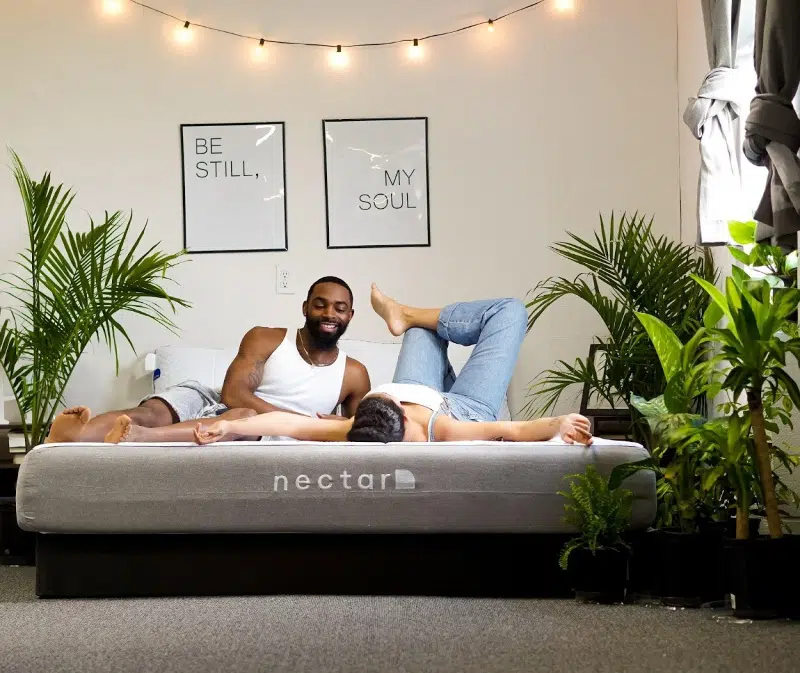Have you ever noticed that, as you get older, you wake up a little sooner or all night long? You may find that you get fewer shut-eye hours or that you fall asleep during the day.
A good night’s sleep is but a fantasy for many older people. After just a few hours, they have trouble falling asleep and just lay in bed. Daily exhaustion may be so frustrating that they will not be able to drive or take part in other regular activities.
How Much Is Enough?
There is no correct amount of sleep. What you see as the right amount can be completely different from what your neighbor wants. Each night, however, experts recommend that adults get 7 to 9 hours.
If you get less sleep on your firm latex mattress than you did when you were younger, but still feel relaxed and healthy, you may just need less sleep than you used to. But there are some ways to get better rest when you feel tired because of it.

Understand your sleep needs
Sleep patterns are somewhat different with age, but shifts “are not dramatic,” according to Michael V. Vitiello of Seattle University’s Professor of psychiatry and behavioral science. Circadian rhythms that help determine the daily sleep-wake cycles of a person are thought to undergo a “phase forward” with age, which means that the sleep phase begins earlier. The average amount of nightly sleep shrinks only about one to 1.5 hours from the age of 18 to 81 or so. And you still don’t need a full eight hours, says Vitiello. Seven hours of sleep on a quality mattress, is the standard for most adults, according to the guidelines.
Improve sleep habits
In many situations, you can improve your sleep by dealing with emotional issues, changing the atmosphere of your rest, and choosing better daily habits. And, since everyone is unique, some experimentation may be necessary to find the specific changes that work best for improving your sleep.
- Firstly, use light to boost your melatonin levels. Artificial lights at night can reduce the production of melatonin – the hormone that makes you sleepy – in your body. You may opt for low-wattage bulbs, and turn off the TV and computer for at least an hour before bed.
- Do not read at night from a backlit device (such as an iPad). Use an eReader that needs an additional light source that is if you prefer to use a portable electronic device to read.
- Make sure that your bedroom is calm, dark and cold, and that your bed is comfortable. As we age, we are often more sensitive to noise, and light and heat can also cause problems with sleep. It can be helpful to use a sound machine, earplugs, or a sleep mask.
- Only use your bedroom for sex and sleep. Your brain will associate your bedroom with just rest by not working, watching TV, or using your computer in bed.
- Move your bedroom, clocks out of the view. The light can disrupt your sleep and is a surefire recipe for insomnia, which will make you anxiously watch the minutes tick by.

Check your lifestyle
Enhance your night-time sleep by eating sensibly, maintaining a healthy weight, and exercising daily. Quitting cigarettes also helps if the body is out of nicotine. Confine your caffeine to the morning: Before noon, sipping coffee or tea is fine, but after lunch, stick with decaf versions.
While some adults remain active throughout their lives, many of us are less active as we grow older. A lack of daily workout can make it more difficult for you to fall asleep and sleep all night long. The afternoon alertness boost you’re looking for can turn into edginess and wakefulness at night.
In fact, it turns out to be ineffective in throwing down a nightcap to sleep better. While alcohol at first makes you sleepy, insomnia tends to increase. In general, tolerance decreases with age when it comes to the effects of alcohol. So it’s safer for your sleep and overall health to drink in moderation–at most.
Propped up? Ask why.
It’s not a big deal to sit in your La-Z-Boy for a while or have an adjustable bed frame. But if you need a recliner or an upright chair to sleep at all, it might be a sign of medical problems. According to experts, when someone can’t sleep lying in bed–and they have to sit up–it’s worth looking at additional conditions. Applying a mountain of pillows to breath may suggest a worse shift in situations such as congestive heart failure. It will enhance your sleep by getting tested and treated.
Practice sleep hygiene
You can do a great deal to promote a better atmosphere for sleep. Not surprisingly, it is a priority to reduce noise. If switching bedrooms can get away from traffic noises, do so for a quieter environment. To make your room look darker, pull the shades. Try checking out black Friday mattress deals 2018 for various options. But first, clear the room around your bed and on the floor. A clutter-free bedroom helps prevent falling and makes it easier to sleep better. Switching from flannel to cotton pajamas and lowering the thermostat–keeping cold allows people to sleep. Moreover, to foster a consistent sleep pattern, set a regular bedtime and morning alarm.

Try Light Exposure
As part of the plan of sleep treatment, light therapy is used. You may need more light in the morning if you have trouble sleeping at night or delayed sleep-phase syndrome. Light exposure is an essential factor in telling the body when to relax (by increasing the production of melatonin) and when to wake up. First thing in the morning, a stroll outside, or 30 minutes of light therapy can help.
On the other hand, when you notice that you wake up too early in the morning or have an advanced sleep-phase syndrome, you may need more light in the late afternoon. You may be able to try outdoor exercise or light therapy for two or three hours at night. Home light therapy units are available. They may be approved for use in combination with your sleep therapy by your doctor or sleep specialist.
Consider Aromatherapy
A 2011 analysis found no studies that are adequately reliable to provide good evidence for sleep aid aromatherapy. Although English lavender aromatherapy oil was traditionally used to assist people in sleeping. It’s known as one of the available calming essential oils in the market. Try to put a sachet of lavender under your pillow or put one or two drops of essential oil of lavender in a handkerchief. Or add several drops of lavender oil to a bath — the reduction in body temperature also helps with sleep after a warm bath. Chamomile, patchouli, and ylang-ylang are other aromatherapy oils that can help you with sleep.
Manage medical conditions
Insomnia in the elderly is probably a result of coexisting conditions and side effects of treatment rather than of aging itself, as Vitiello says. Older adults with complications have a higher risk of complaining of sleep deprivation. When you treat a condition such as diabetes or heart disease, ask your doctor or pharmacist about the possible side effects of your drugs. If that is so, changing the amount of time of the doses to different medications can be helpful.
Final Words: Consult your doctor about sleep problems
If you are unsuccessful in your own attempts to solve your sleep problems, keep a sleep diary, and take it to your doctor. Write it down and track your medicines and practice, lifestyle changes, or recent stresses when you are taking alcohol, caffeine, and nicotine. Your doctor should refer you for further care to a sleep specialist, particularly if your mood and your health are severely affected by insomnia.